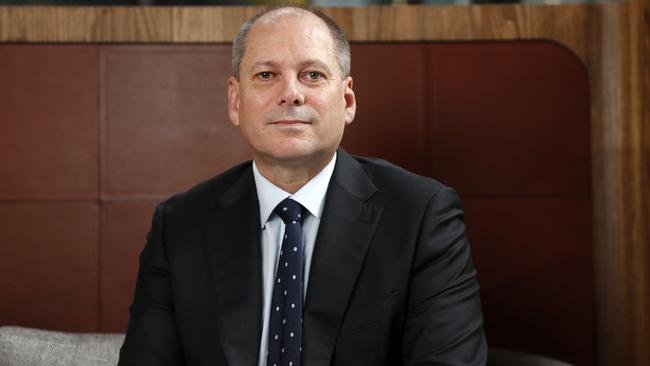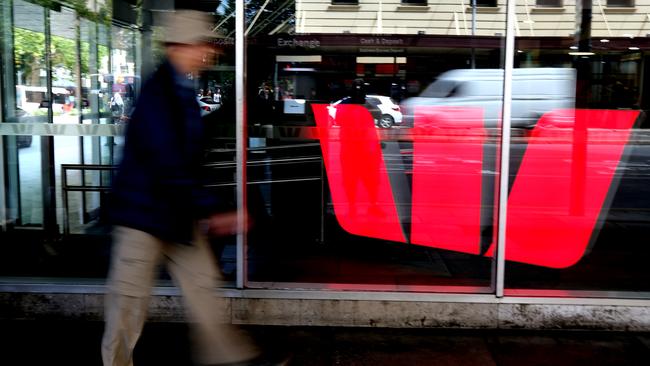Westpac flags potential cash return, tips swift economic recovery
Westpac boss Peter King tips the domestic economy to swiftly recover from Covid-19 lockdowns, in two phases.

Westpac chief executive Peter King expects the domestic economy to swiftly recover from Covid-19 lockdowns in two phases, as domestic restrictions eventually ease and then international activity resumes due to higher local vaccination rates.
His comments came as the bank flagged the potential return of capital to investors later this year, to coincide with its full-year results in November. Westpac reported that asset sales would boost capital buffers and that stressed loan exposures had declined.
In a June quarter regulatory update, Westpac’s board said excess capital and franking credits meant it would consider returning capital to investors and may have more to say with its annual results on November 1.
Mr King said the economy was being held back amid the pandemic restrictions across several states and territories, but a bounce back would occur when vaccination rates increased and restrictions eased.
“We‘ve also got historically low interest rates in terms of the cost of debt in the economy, so that’s good. We’ve got governments pumping in a lot of support, so again that’s good for the economy,” he said. “Longer term, if I think into 2022 or maybe a little bit longer, certainly the domestic activity will pick up as we’ve got less restrictions domestically.
“Then once we get the vaccination rates up to the levels that the government has talked about, I think it‘s 80 per cent, then international activity will increase. So I’m confident that we will see a bounce back.”
Mr King – who has had both his vaccination shots – said Westpac was strongly encouraging staff to get vaccinations and was participating in a pilot where companies were overseeing jabs at their own sites.
He also highlighted that the bank expected rapid Covid-19 testing would “play a big role” in helping companies navigate the coming months.
Despite the Covid-19 uncertainty gripping the economy, and its expectations for a contraction in growth in the September quarter, Westpac remains positive on economic output. The bank in June upped its gross domestic product expectations to 4.8 per cent for 2021 from 4 per cent, and ratcheted up estimates for next year to 3.2 per cent from 3 per cent.
Since then the bank has cut its estimates for 2021 growth rates several times, most recently lowering GDP expectations to 2.4 per cent from 3.2 per cent amid expectations Sydney’s lockdown may last until October 31. But that will lead to a sharp rebound in economic output in 2022 estimated to print at 5 per cent growth.
The bank rules off its financial year September 30.

In Tuesday’s update, Westpac also said it was growing in line with sector rates in Australian mortgages and business lending in the June quarter, which is slower than that highlighted over the past week by Commonwealth Bank and National Australia Bank, which both said they were exceeding industry rates.
Westpac’s shares fell 1.3 per cent to $25.45 on Tuesday.
The bank’s loan book performance improved, ahead of Covid-19 lockdowns which are now in force across NSW, Victoria and the ACT.
Westpac said stressed loans fell to 1.51 per cent of total committed exposures as at June 30, down from 1.6 per cent three months earlier.
But total impairment provisions were broadly steady at $5.54bn in the June quarter, compared to $5.51bn in the March quarter, as the bank made a $300m individually assessed provision for “one large exposure”. That reflected the alleged fraud by leasing group Forum Finance and founder Bill Papas against Westpac, which is subject to legal action in the Federal Court.
Mr King said it was “very disappointing” the bank had suffered from the alleged fraud by Forum.
“In terms of the quarter, we have fully provisioned for that exposure,” he added.
In the mortgage book, home loans which were classified as 90-plus day delinquencies fell to 111 basis points, from 120 basis points in the March quarter. But properties in possession by the bank edged up to 199.
In the consumer finance portfolio, reflecting largely personal and car loans and credit cards, 90-plus day delinquencies improved to 1.82 per cent as at June 30.
As at August 11, Westpac had $1.6bn in home loan balances on Covid-19 repayment pauses, and $29.5m in business loan balances in repayment deferrals. But that pales in comparison to 2020 when the bank provided $55bn in mortgage repayment deferrals and $10bn in business repayment pauses.
Morgan Stanley banks analyst Richard Wiles said he expected the hit from the Forum alleged fraud and lower markets and treasury income would weigh on Westpac’s second-half profit.
Credit Suisse analysts said they saw “considerable earnings upside” for Westpac in 2022 and 2023, albeit with some execution risk.
“We see Westpac as an unloved restructuring story,” they added.
The bank reiterated caution that net interest margins – what the bank earns on loans minus funding and other costs – would be lower in the six months ended September 30, from the prior half, and annual 2021 expenses would be higher than last year. Risk weighted assets rose $8.5bn in the June quarter to $437.4bn.
Mr King said Westpac’s balance sheet was in “good shape” and the board would consider dividends and a capital return leading into its annual result.
CLSA analyst Ed Henning said the major takeaway from Westpac’s update was the signalling of capital management activity.
He expects a $5bn buyback will accompany the bank’s annual results.
Westpac’s proforma common equity tier one ratio printed at 12.5 per cent, including benefits from announced but not completed asset sales such as the divestment of its lender’s mortgage insurance unit and motor vehicle finance division. As at June 30, the actual common equity capital ratio was 12 per cent down from 12.3 per cent as at the March quarter, but above the banking regulator’s 10.5 per cent “unquestionably strong” threshold.
Westpac on Tuesday also kicked off an investor offer for $1bn in tier one capital notes.
Still, the bank’s board opted not to immediately join major rivals in announcing a capital return.
CBA delivered a bumper $6bn share buyback for investors last week, and posted a better-than-expected rise in annual cash profit to $8.65bn underpinned by strong lending and lower loan impairments.
ANZ started the latest capital management wave last month by outlining a $1.5bn buyback and NAB was second in line with a $2.5bn capital return.
Last week, NAB reported a 10 per cent jump in cash profit to $1.7bn for the June quarter. ANZ rounds out updates from the big banks on Wednesday.






To join the conversation, please log in. Don't have an account? Register
Join the conversation, you are commenting as Logout